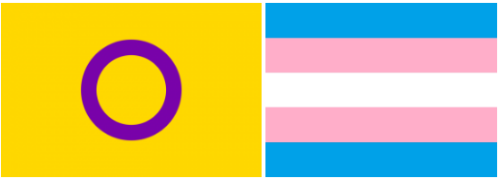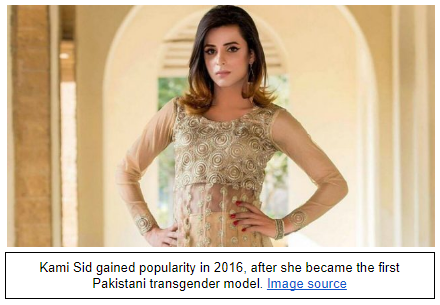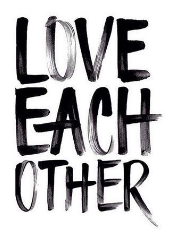BY ZAINAB FATIMA AND THEA RICHINSON

November 8 was Intersex Day of Remembrance and November 20 was Transgender Day of Remembrance. We have come a very long way as a society when it comes to being accepting to every person. People are becoming more open minded because they realize that everyone is equal; that we all have basic human rights. However, this movement has not benefitted all transgender and intersex individuals everywhere. One of these places is Pakistan.
According to NBC News, the Supreme Court of Pakistan announced that the transgender community could receive national identity cards where they were placed under a “third sex” in 2009.
In 2011, the Pakistani government gave its transgender population the right to vote. The following year, they were given equal rights by the Supreme Court, such as “the right to inherit property and equal opportunity in education and employment” as stated in The New York Times.
Parliament is in favor of a law that recognizes Pakistan’s transgender community as equal individuals, and also states punishment for those who go against this law. The support for this is very significant, because it is the first time the country is passing such a law for its transgender citizens.
All of the country’s prime political parties favour the Transgender Persons Protection of Rights bill. This law gives justice to intersex, transgender, and everyone who does not fit in the society’s ‘norm’, the right to identify as who they are.
Earlier in 2017, the transgender community was at last included in Pakistan’s national census. In June of this year, the Pakistani passport finally added a third gender category for its transgender citizens. Farzana Riaz, a Pakistani woman, received her passport in June of this year. Riaz’s passport has an ‘X’ under the gender section, which is a third gender aside from male (M) and female (F). The creation of this new category is a big step towards providing equal rights to the transgender and intersex community.

But all of these changes do not mean that the intersex and transgender communities of Pakistan are viewed as equal in the eyes of the society. These individuals still face abuse and discrimination from the general public. Many are forced to be beggars, dancers or prostitutes to earn a living.
The vast South Asian majority doesn’t view intersex and transgender individuals as a valued part of society. In Pakistan, most of who identify as transgender or intersex live in a community called “khawaja sira”, which is “an umbrella term dating centuries to the Mughal era and denoting a third sex that includes cross-dressers, eunuchs and intersex people, as well as transgender women and men”. Khawaja siras (kha-wa-ja se-ras) often separate from their families due to the judgment and abuse from the society, and live under the protection of their new families. A guru, or mother figure, is in charge of many young khawaja siras. The gurus earn a portion of the money of those they look after, as an exchange for protection and a home.
However, the gurus are not always fair or protective. Nadeem Kashish, a transgender woman, told The New York Times that her guru had taken advantage of her financially. Kashish is also against the khawaja sira culture because it is does not present the community in a positive light. This is because when people are part of the khawaja sira culture, their job option are quite limited. People look down upon others who work in the sex industry, and when a transgender person asks for money, many become uncomfortable or ignore them. Aside from the issues with the gurus, the public isn’t welcoming to anyone who is part of the khawaja sira culture. The reason that trans people are forced to live so differently than the rest of society in Pakistan is because the majority is quite conservative, where people turn away from anyone who is a sex worker or dancer at parties. A community like khawaja sira isolates one from society. Being forced to be beggars, people generally avoid them because they feel uncomfortable, which is quite isolating and disrespectful.
As the world is recognizing the rights of intersex and transgender individuals around the world, the movement is also affecting those in Pakistan. Many young, transgender and intersex Pakistani individuals are separating themselves from the khawaja sira community to find a path where they won’t be taken advantage of. Perhaps the most popular example is Kami Sid, 27, who became Pakistan’s first transgender model last year. In an article from the Guardian, Sid stated,“I became a model; tomorrow I’ll become a mum. People think we’re just sex workers or beggars or dancers. After modelling, I’ve said we can become anything – doctors, engineers, teachers. We just need a platform.” She also said that she doesn’t want to be given a third gender. She wants to be called a woman, because that’s who she is. Sid says that she wants to be regarded as a normal member of society.

It is amazing that individuals like Sid are making a name for themselves in the world. The transgender and intersex persons of Pakistan should know that they have equal rights for every job, and that there are no limitations for what they can accomplish.
However, for Sid’s views to become a reality for all Pakistani transgender individuals, the prime focus for the government should be the general public. As Mehlab Jameel stated in The New York Times, the government of Pakistan should start a campaign to sensitize everyone in the country, from the office men to the police to the government officials. Once the public accepts the change, that will make a true difference.
There have been many articles and videos made about the transgender community. ‘Transgender: Pakistan’s Open Secret’ is a documentary by Real Stories, which contains many interviews and insights of the lives of several transgender individuals in Karachi, Pakistan. It goes in details about how the society treats the transgender community, as well as their struggle in trying to find equality. The documentary is in Urdu, but contains English subtitles, which makes it easier for many people to understand it. You can find it on youtube by searching “Transgender: Pakistan’s Open Secret”, please be advised that this is not for everyone and contains sensitive material.
MD student, Zainab Fatima, saw many transgender people in her hometown of Karachi, Pakistan, near the traffic lights or markets, asking for money or other necessities. As a child, she always wondered who they were and why they asked for money. Many people ignored them, or gave some money if they felt sorry for them. She wasn’t told much about the transgender community in Pakistan and, due to this, she did much of the research herself in order to educate herself on this topic. And to say the least, it was a very emotional experience. Living in Karachi, it is hard to believe how many things can be hidden, that someone can have an amazing life and not know that there are people who can’t even receive basic respect.
The purpose for writing this article to to deliver the point that everyone has the right to be safe, to feel safe in their home, and to feel safe in their own skin. Yes, this message may seem quite ordinary in a place like Canada, but it is necessary to realize that this is not the case everywhere. Transgender, intersex and all who do not fit in the box of the “typical / ideal male or female” are still threatened, abused, harassed and even murdered in many places, even here in North America. As people who live in an accepting environment, we should spread the message, and try to get others to be more inclusive.

